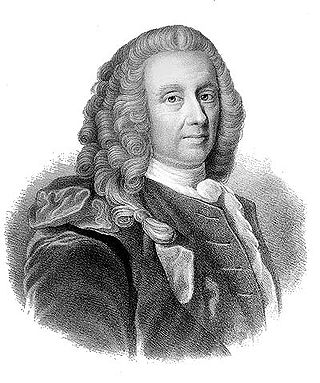Related Research Articles

Ludvig Holberg, Baron of Holberg was a writer, essayist, philosopher, historian and playwright born in Bergen, Norway, during the time of the Dano–Norwegian dual monarchy. He was influenced by Humanism, the Enlightenment and the Baroque. Holberg is considered the founder of modern Danish and Norwegian literature. He was also a prominent Neo-Latin author, known across Europe for his writing. He is best known for the comedies he wrote in 1722–1723 for the Lille Grønnegade Theatre in Copenhagen. Holberg's works about natural and common law were widely read by many Danish law students over two hundred years, from 1736 to 1936.

Børsen, also known as Børsbygningen, is a 17th-century stock exchange in the center of Copenhagen. The historic building is situated next to Christiansborg Palace, the seat of the Danish Parliament, on the island of Slotsholmen. Børsen, a popular tourist attraction, is most noted for its distinctive spire, shaped as the tails of four dragons twined together, reaching a height of 56 metres.

Johan Frederik Clemens was a Pomeranian-Danish printmaker in etching.

Niels Klim's Underground Travels, originally published in Latin as Nicolai Klimii Iter Subterraneum (1741), is a satirical science-fiction/fantasy novel written by the Norwegian-Danish author Ludvig Holberg. His only novel, it describes a utopian society from an outsider's point of view, and often pokes fun at diverse cultural and social topics such as morality, science, sexual equality, religion, governments, and philosophy.

Caroline Amalie Thielo was a Danish actress, one of her country's first professional native female actors, and said to be the first actress ever employed at the Royal Danish Theatre in Copenhagen. She was very popular in the mid-18th century, and was also employed as a translator of plays for the theatre.

Ernst Henrich Berling was a German-Danish book printer and publisher. From 1749 he published Danske Post Tidender, which would later become Berlingske Tidende.

Frederik Ludvig Liebenberg, was a Danish literary historian, translator, critic and publisher. He is remembered especially for his editions of Ludvig Holberg and Adam Oehlenschläger.

Peter Frederik Suhm, was a Danish historian.

Theobald Stein was a Danish sculptor. He was a professor at the Royal Danish Academy of Fine Arts and served as its director from 1883 to 1886.
Events from the year 1741 in Denmark.
Events from the year 1774 in Denmark.

Erasmus Montanus is a satirical play about academic snobbery set in rural Denmark. Written by Ludvig Holberg in 1722, the script was first published in 1731 and performed in 1747. Today, it is among Holberg's most frequently performed works. The play centers on its eponymous protagonist who returns to his rural village after studying in Copenhagen to find his new worldview causes conflicts in his everyday life.

Johan Frederik Schultz was a Danish book printer and publisher.

Anna Magdalena Godiche née Høpfner was a Danish book printer and publisher. She managed the biggest printing company in contemporary Denmark.

Salomon Soldin was a Danish bookseller, publisher, editor, writer and translator.
Peder Benzon was a Danish landowner and Supreme Court justice. He was the owner of seven manors on Zealand at the time of his death in 1735.

Niels Lunde Reiersen was a Danish government official, merchant, silk manufacturer, landowner and philanthropist. He was the owner of the Royal Danish Silk Manufactury in Copenhagen (1775-1796) as well as a founding partner of the leading trading firm De Coninck & Reiersen (1775-1790). Reiersen owned Nysø Manor, Oremandsgaard Manor and Lilliendal Manor as well as the estates at Jungshoved and Høfdinggård on Southern Zealand.
Niels Aage Anton Nielsen was a Danish professor of Nordic languages at Aarhus University. He was also a leader in the Danish resistance movement.
Mengel is a surname. Notable people with the surname include:
References
- 1 2 3 "Christian Gotlob Mengel" (in Danish). Dansk Biografisk Leksikon . Retrieved 16 April 2020.
- ↑ Rasmus Nyerup, Jens Edvard Kraft (1819). "Dansk-norsk litteraturlexicon ..." (in Danish). Retrieved 16 April 2020.